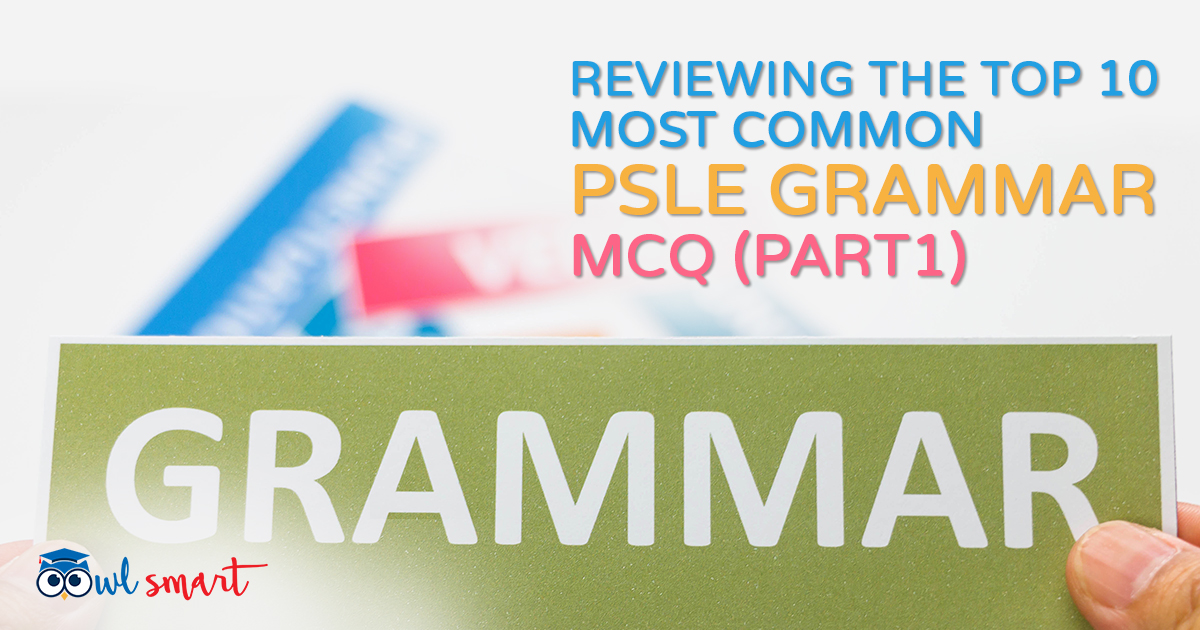
 | This is the first of three articles that will look at the Grammar MCQs that appeared in PSLE 2016 and 2017. We will share these questions with you and the explanations for the answers. The main purpose of this article is to get the student to be familiar with the structure and requirements of these common questions. |
Question 1 – Verb + Object + Bare Infinitive
Krishnan helped the old lady __________ her keys from the drain. (PSLE 2017)
|
(1) retrieve |
(2) retrieves |
(3) retrieving |
(4) retrieving |
|
Answer: (1) retrieve |
Uncle Azman recounted how his mother would watch him __________ the bus for school every morning. (PSLE 2016)
| (1) board | (2) boards | (3) boarded | (4) boarding |
|
Answer: (1) board |
Explanation
These two questions simply follow the grammar rule stated above.
-
Krishnan helped (verb) the old lady (object) retrieve (bare infinitive) her keys from the drain.
-
Uncle Azman recounted how his mother would watch (verb) him (object) board (bare infinitive) the bus for school every morning.
Other common verbs that behave in a similar manner are let, make, see, hear, feel, watch and notice.
Question 2 – Gerund Form of the Verb
Norlina spotted her friend __________ and waved excitedly to her. (PSLE 2017)
|
(1) approach |
(2) approaches |
(3) approached |
(4) approaching |
|
Answer: (4) approaching |
Ted mentioned __________ his colleagues a treat but he soon forgot. (PSLE 2016)
|
(1) gave |
(2) giving |
(3) would give |
(4) would be giving |
|
Answer:(2) giving |
Explanation
These two questions require the gerund form of the verb.
-
Norlina spotted her friend approaching and waved excitedly to her.
(This is an interesting question. It is usually used in this manner; spot somebody/something doing something. Another example is Sue spotted smoke coming out of that house.)
-
Ted mentioned giving his colleagues a treat but he soon forgot.
(The gerund is commonly used after quite a number of different verbs. All of these verbs can be followed by nouns instead of gerunds. A key point to remember is that gerunds function as nouns in sentences.)
Other common verbs that have a gerund following them are resist, consider, avoid and finish.
Question 3 – Quantifiers
__________ people would understand the hardships of war unless they have been through it themselves. (PSLE 2017)
|
(1) Few |
(2) Most |
(3) Many |
(4) Some |
|
Answer: (1) Few |
All the furniture __________ moved to another room just now,” Linda said. (PSLE 2016)
|
(1) Is |
(2) are |
(3) was |
(4) were |
|
Answer: (3) was |
Explanation
These two questions test quantifiers associated with countable and uncountable nouns. In addition, they require the student to understand the context of the question.)
-
Few people would understand the hardships of war unless they have been through it themselves.
(The student can infer from the use of the connector ‘unless’ that the answer needs to have a meaning of ‘not many’ and also the fact that people are countable nouns.)
-
“All the furniture was moved to another room just now,” Linda said.
(The student should be able to infer that the use of ‘just now’ requires the use of the past tense. A common misconception is that all verbs in a dialogue are in the present tense. In addition, furniture is unaccountable. Another common misconception is that furniture are countable as students think of them as individual items like the sofa, the dining table and the television cabinet as separate items being grouped together.)
About the Author
Teacher Chin has more than a decade of experience in teaching English from Primary Two to Primary Six in local primary schools. He is presently, in his free time, having immense enjoyment experimenting with the Nimzo-Indian Defence in chess and trying out the Apacs Lethal 9 in badminton doubles.



